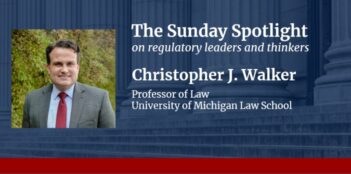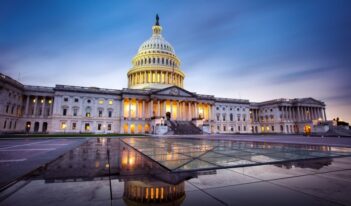
Policy experts consider the constitutionality of a cornerstone of the President’s regulatory reform efforts.
Just ten days after taking office, President Trump signed an executive order directing federal agencies to eliminate two existing regulations for every new regulation issued. This “one-in-two-out” requirement in Executive Order 13,771 has been the subject of much debate among practitioners, regulators, and scholars.
Although the plan has received support from business groups like the U.S. Chamber of Commerce, others have criticized the President’s strategy for failing to consider the benefits of regulations and instead focusing only on the quantity and costs of rules issued.
In addition to policy criticisms of the executive order, some have suggested that it may also be illegal.
In this series of essays, The Regulatory Review presents a debate over the constitutionality of Executive Order 13,771. The series begins with an essay by Scott Slesinger of the Natural Resources Defense Council and Robert Weissman of Public Citizen explaining the lawsuit they have filed in federal court against the order and arguing that the order is unconstitutional.
Next, Sam Batkins of the American Action Forum responds to their essay, arguing that the executive order only re-orients priorities and does not alter any legal obligations—likening it to an executive order signed by President Obama that directed agencies to “modify, streamline, expand, or repeal” regulations.
Slesinger and Weissman respond to Batkins by pointing to Executive Order 13,771’s unprecedented requirement for the removal of existing regulations, which they argue calls on agencies to violate requirements imposed by Congress to implement regulatory safeguards. They conclude that the executive order violates constitutional separation-of-powers principles and the President’s obligation to ensure “that the laws be faithfully executed.”
In a final reply, Batkins contends that the decline in regulatory output under the Trump Administration is an entirely permissible “political choice”—not a constitutional problem—and that some of Slesinger and Weissman’s criticisms of Executive Order 13,771 apply with equal force to the Office of Information and Regulatory Affairs’ (OIRA) regulatory review process.
Donald Trump’s Unconstitutional Executive Order on Regulations
May 17, 2017 | Scott Slesinger, Natural Resources Defense Council, and Robert Weissman, Public Citizen
Soon after taking office, President Donald Trump issued an unconstitutional executive order requiring administrative agencies to repeal at least two regulations for each new regulation they create. The Natural Resources Defense Council, Public Citizen, and the Communications Workers of America, working with Earthjustice, have sued to block this illegal action. This executive order may be the most far-reaching and damaging of any he has issued. It affects every area of government policy and hamstrings most federal agencies.
It Is Premature to Label a Regulatory Budget Unconstitutional
June 26, 2017 | Sam Batkins, American Action Forum
In their recent essay, Scott Slesinger and Robert Weissman declared that Executive Order 13,771 is unconstitutional. Although Slesinger and Weissman might have legitimate policy objections to Executive Order 13,771 and its application of regulatory budgeting, claims of that order’s unconstitutionality are premature. Executive Order 13,771 does not change the law, just the priorities. This executive order, as countless previous executive orders have done, merely moves the margins of regulation.
Ordering Agencies to Violate the Law
June 27, 2017 | Scott Slesinger, Natural Resources Defense Council, and Robert Weissman, Public Citizen
There is nothing “premature” about judicial review of an executive order that paralyzes federal agencies’ ability to implement duly-enacted statutes. And that is what Executive Order 13,771 does. The order prohibits agencies from issuing new significant regulations unless they repeal at least two other regulations. Complying with that direction requires agencies to violate the law. For this reason, the executive order itself violates the constitutional separation of powers doctrine and the President’s duty to “take care that the laws be faithfully executed.”
The Constitutional Executive Order on Regulatory Budgets
June 28, 2017 | Sam Batkins, American Action Forum
The constitutional concerns that Scott Slesinger and Robert Weissman express over Executive Order 13,771 are little different than the kind of policy objections raised during previous administrations about other presidential efforts to oversee the work of regulatory agencies. Their constitutional argument suffers from several significant flaws. Even if a lawsuit challenging Executive Order 13,771 were ripe for judicial consideration, they face an incredible burden of convincing a court that the executive order is unconstitutional.



